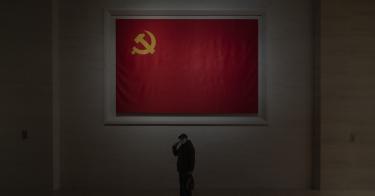What comes to mind when you hear the words “lab leak theory”? Most of us would think “COVID-19,” the disease that has so disrupted our lives for two years now.
Many would then attach a modifier to it like “discredited” or “debunked.” But those who do would be far behind the curve. Other than the fact that it came from China, the origin of COVID-19 remains an open question—even among the scientific community.
At the outset, it is important to sort out exactly what is at issue here. The debate is not over whether the virus was created in China and purposely released to sow biological chaos. It is not over whether it was engineered at all. It may have been. The question is whether the virus developed and spread naturally from bats in a cave in southern China to humans a thousand miles away in a Wuhan market, or whether it accidentally leaked from research facilities in Wuhan renowned for studying similar viruses.
In Viral: The Search for the Origin of COVID-19, Dr. Alina Chan from the Broad Institute at the Massachusetts Institute of Technology and science writer Matt Ridley objectively lay out the cases for both theses. In making the case for natural origins, they reference the possible motivations for those promoting the lab theory. Among this crowd, they count “critics of the Chinese Communist Party… will(ing) to believe any theory that blames the Chinese state.”
>>> China Transparency Project
As the old Hollywood line goes, “I resemble those remarks.” Given its generally terrible track record with the truth, the burden of proof must fall on the Chinese Communist Party (CCP), and anyone accepting its version of the facts.
Since the news of COVID-19 first became public at the end of 2019, the lies, coverups, deflection, stonewalling, and crackdowns on whistleblowers have made it impossible to believe China-friendly explanations for the outbreak. And I’m just talking about the natural origin thesis, not the more outlandish ones offered by the government, like those involving Fort Detrick or American involvement in the Military World Games. Even Anthony Fauci, the chief medical adviser to the President of the United States, acknowledged in May 2021 that he was “not convinced” of the virus’ natural origin—implying the possibility of a lab leak.
The CCP’s tenuous relationship with the truth matters, not just for its impact on global public health—which should now be obvious to everyone—but across the board.
Take its politics and military.
Last year’s “Chinese Transparency Report” from The Heritage Foundation evaluates official Chinese transparency and seeks to fill in the very wide gaps with publicly available data. On politics, there is some extraordinary privately-compiled data out there—like MacroPolo’s “The Committee” and UC San Diego’s “Data Lab: CCP Elite Portal”—that improves visibility into the Chinese decision-making apparatus.
But despite all the fine work of independent researchers, no one really knows with any confidence how national security decisions are made in Beijing. All we know for sure is that their government white papers, annual reports, statements of ministries and government work reports are mere shadows representing real policy.
The information China provides regarding the development and budget of the People’s Liberation Army is also woefully insufficient to give a clear picture.
Knee-jerk defenders of Beijing may say, “Well, the U.S. does the same thing.” Actually, no, it doesn’t. Of course, the American military keeps many things secret, but debates over its budget and efficacy are carried out in public. This requires release of an enormous amount of supporting documentation.
These things matter to international peace and security, because China’s military looms so large over the Western Pacific region. Transparency builds confidence. If China’s intentions are benign, there is no need to hide its capabilities. In the absence of transparency, it is only prudent for the rest of the world to prepare for the worst.
In particular, the combination of obscurity around decision making and military development puts Taiwan at great risk. We can make educated guesses about what China may or may not do on Taiwan, and when. But that is all they are, even the most educated among them.
This uncertainty is deeply destabilizing.
In February 2020, U.S. Sen. Tom Cotton, (R-Ark.) gained the opprobrium of experts and political opponents when he suggested that COVID-19 may have originated in a biolab in Wuhan. Now, it turns out, he was just ahead of the curve.
But Senator Cotton said something else that has application well beyond COVID-19. “Because of China’s duplicity and dishonesty from the beginning,” he said, “we need to at least ask the question to see what the evidence says, and China right now is not giving evidence.”
On COVID-19 and other matters on which the world’s well-being depends, transparency in China is not improving. And the international community is much worse off for it.
This piece originally appeared in Taipei Times



